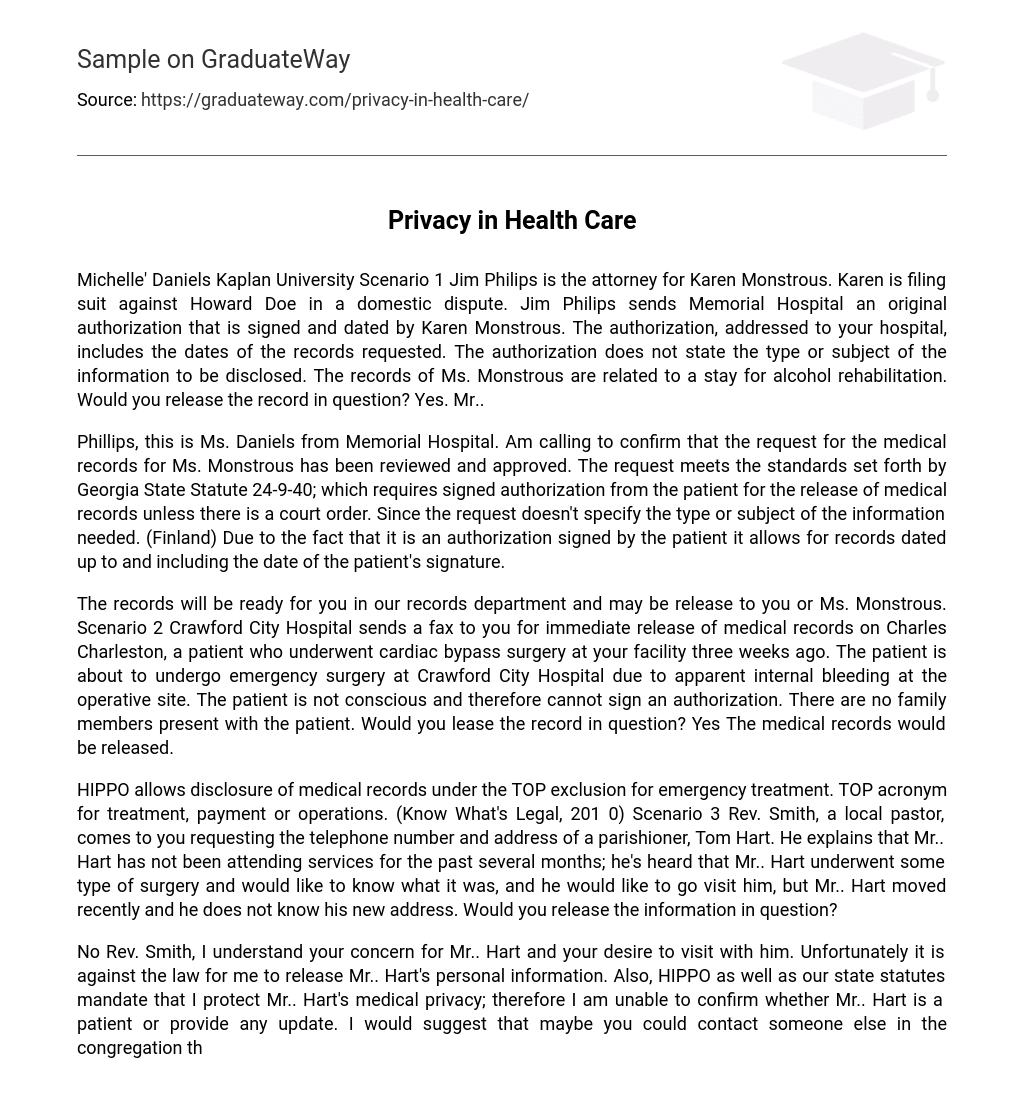Michelle’ Daniels Kaplan University Scenario 1 Jim Philips is the attorney for Karen Monstrous. Karen is filing suit against Howard Doe in a domestic dispute. Jim Philips sends Memorial Hospital an original authorization that is signed and dated by Karen Monstrous. The authorization, addressed to your hospital, includes the dates of the records requested. The authorization does not state the type or subject of the information to be disclosed. The records of Ms. Monstrous are related to a stay for alcohol rehabilitation. Would you release the record in question? Yes. Mr..
Phillips, this is Ms. Daniels from Memorial Hospital. Am calling to confirm that the request for the medical records for Ms. Monstrous has been reviewed and approved. The request meets the standards set forth by Georgia State Statute 24-9-40; which requires signed authorization from the patient for the release of medical records unless there is a court order. Since the request doesn’t specify the type or subject of the information needed. (Finland) Due to the fact that it is an authorization signed by the patient it allows for records dated up to and including the date of the patient’s signature.
The records will be ready for you in our records department and may be release to you or Ms. Monstrous. Scenario 2 Crawford City Hospital sends a fax to you for immediate release of medical records on Charles Charleston, a patient who underwent cardiac bypass surgery at your facility three weeks ago. The patient is about to undergo emergency surgery at Crawford City Hospital due to apparent internal bleeding at the operative site. The patient is not conscious and therefore cannot sign an authorization. There are no family members present with the patient. Would you lease the record in question? Yes The medical records would be released.
HIPPO allows disclosure of medical records under the TOP exclusion for emergency treatment. TOP acronym for treatment, payment or operations. (Know What’s Legal, 201 0) Scenario 3 Rev. Smith, a local pastor, comes to you requesting the telephone number and address of a parishioner, Tom Hart. He explains that Mr.. Hart has not been attending services for the past several months; he’s heard that Mr.. Hart underwent some type of surgery and would like to know what it was, and he would like to go visit him, but Mr.. Hart moved recently and he does not know his new address. Would you release the information in question?
No Rev. Smith, I understand your concern for Mr.. Hart and your desire to visit with him. Unfortunately it is against the law for me to release Mr.. Hart’s personal information. Also, HIPPO as well as our state statutes mandate that I protect Mr.. Hart’s medical privacy; therefore I am unable to confirm whether Mr.. Hart is a patient or provide any update. I would suggest that maybe you could contact someone else in the congregation that may be able to provide you with his rent contact information. Scenario 4 Deputy Sheriff Parker arrives in your office requesting to see the records of Sally Jones.
Sally was involved in an altercation at a local establishment last night. Deputy Parker does not have an authorization, search warrant, or subpoena. Would you release the information in question? No. Why, or why not, and how would you proceed? It would be unlawful to release Ms. Jones medical information without the proper documentation to authorize the release. I would explain to Deputy Parker that he would need to obtain a signed authorization from Ms. Jones or obtain a subpoena that specifies what documents are to be produced and should be signed, stamped and have the seal of the official empowered to issue the subpoena. Risk Management, Legal and Ethical Aspects of Health Information Management) Scenario 5 Judy is 21 years old. She wants a copy of her medical records from Calculator Hospital, including records from when she was 16 years old. She comes to the department, shows identification, signs an authorization, and wants to wait for the copies to be prepared. Would you release the information in question? Yes, The Privacy Rule provides the patient the right to receive copies of their medical records. A reasonable fee may be charged for copies and or mailing of the records. Your Medical Records) Why, or why not, and how would you proceed? Would provide the patient with an authorization form and request that she fill it out completely. Would request a valid ID would ask the patient the reason she needs the records; that would help determine which records would be of use for her particular request. I would determine if the request was of an urgent nature If not urgent, I would advise the patient that she should allow at least 5 days for ere request to be filled due to the fact that request are completed in the order that they are received.





